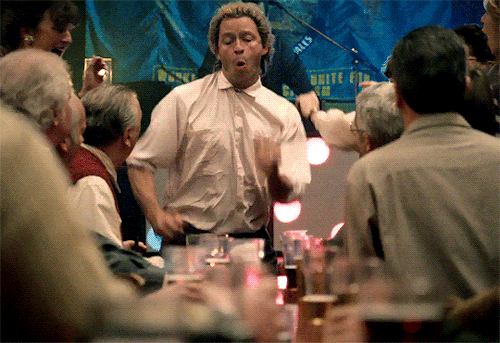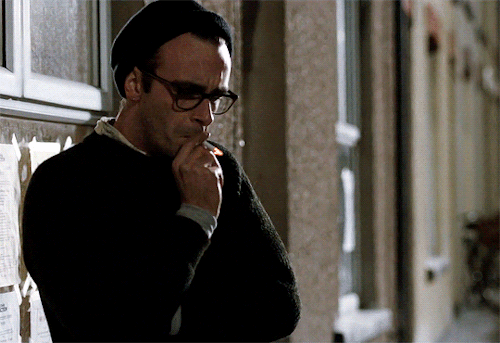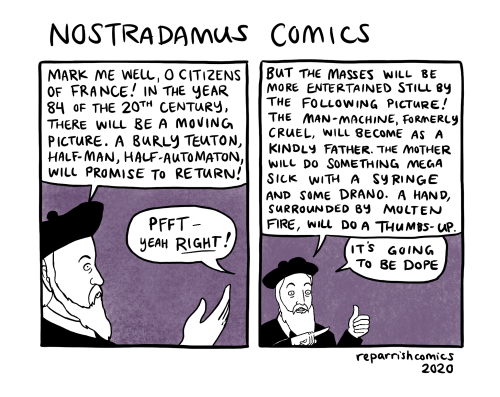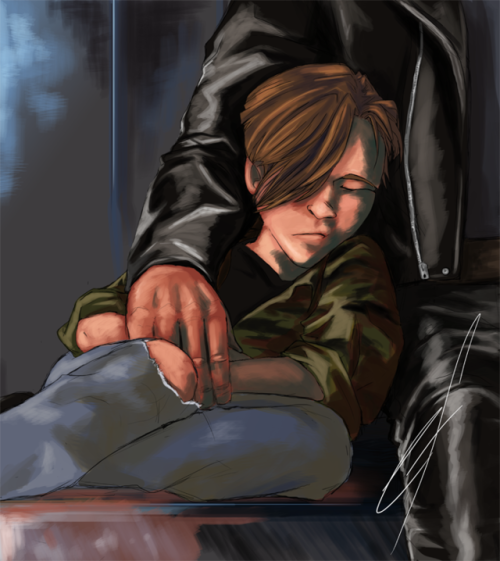#john connor






Christian Bale as John Connor in Terminator Salvation (2009) dir. McG

study
Guns & Roses-You could be mine
Here is my basic thesis for the Terminator films:
Terminator 2 contains the seeds of every mistake subsequent Terminator films have made.
In other words, it’s inadvertently responsible for the franchise’s downfall.
Keep reading.
The Big Comforter
TerminatorandTerminator 2: Judgment Day. By common agreement, these are the two best - the two good - films of the franchise. By common agreement, Terminator is great, and Terminator 2 is even better.
To this I say…yes and no.
Some concessions to common wisdom: on its own merits and in most respects, T2 is indeed the better movie. It’s better filmed, for one thing - T1 looks like it was filmed for a family home video, all handheld cameras, whereas T2 can suddenly afford a dolly and so it can give us smooth moving shots. T2 has state-of-the-art CGI which looked great then and still looks great today, while T1’s effects were seemingly put together with Halloween masks and marionettes. And T2 has deeper characters and greater emotional range. It’s a more “human” story, and it’s attractive to us for it.
But. But, but, but.
If we make sense of our world through stories, pretty much the biggest and most pervasive story of the human is, summarized in two words: “We matter.” And by “we” I mean our identity. Not just we, humans as physical beings - our appearance, our general shape, our emotions, our way of life, our world view. We instinctively see these as the best way to be, as the right way to be, as a good and important way to be.
Trouble is, this risks making us complacent. Because to prepare ourselves for the real world, and to really be able to get to grips with our problems, we need to acknowledge that on a certain level the universe does not give a shit about us.
In Hollywood film, this favoring of human identity is chiefly represented in two ways: humanization of non-human things, and favoring human-like things over inhuman things. For instance, almost all dramatic major motion pictures which feature aliens depicting them attempting to invade us. This goes double if they don’t look like us. If the aliens are not evil, chances are they look and sound at least 90% identical to human beings. It’s a form of socially acceptable xenophobia, but it’s generally passive - the core purpose is less about demonizing the other and more about reinforcing our own place of importance in the grand scheme of things.
Now with this in mind, I want you to look at T1 and T2, side-by-side. Forget for the moment that on its own merits T2 is an excellent film: look at them as two iterations of the same basic concept. And nowhere is the difference more obvious than when we first see Arnold in action.
In T1, Arnold’s first real scene is effectively a double rape.
Not literal, but symbolic. Think about the sexual connotations of a muscular man walking up to you naked at night. Think about the violent reactions of the thugs to Arnold asking them for their clothes - they’re in fear of sexual violence, homoeroticism, whatever you like. One of the thugs penetrates Arnold’s stomach with a knife - and then Arnold retaliates by impaling him, his bodily fluids spilling out. It’s intensely erotic - not in the sense of trying to get you aroused, but in manipulating our sense of sex as bound up with power and violence. The score isn’t orchestral or dramatic: it’s barely music at all. A lifeless, electronic pulse that mirrors the Terminator’s pitilessness. This scene is still harrowing to watch - for the rape imagery, for the frightening contrast between the Terminator’s strength and its seeming indifference, for the isolated location, for the harsh visuals and music.
In T2…well, see for yourselves.
We’re in a bar - smooth, even lighting compared to the harsh shadows of T1’s counterpart. Arnold is being ogled by women. We hear some pleasant country music in the background. When the Terminator demands a guy’s clothes, the reaction is mild amusement rather than violent disgust. And when things get ugly, no one really treats it as anything more than a bar fight. Rather than impaling a guy, the Terminator breaks his hand and burns him a little. That the stakes are lower is evidenced by the fact that the bartender doesn’t just shoot the Terminator. It’s not a life-or-death situation. And of course, what do we get as soon as Arnold steps out of the bar? “Bad to the Bone”. And a moment where Arnold snatches sunglasses from the bartender’s jacket. (Note that in the first film he got sunglasses at night to hide his damaged eye. Here he’s taking them to…see better? At night?)
The difference is night and day - almost literally! T1 presents itself as dark, twisted, harrowing - while T2 positions itself as light family entertainment.
Of course, the tonal shift is intentional and quite clever: this Terminator is going to be a heroic figure, so the film is priming us to see him as less threatening before it actually comes out and tells us he’s not the bad guy. It’s consciously undermining the terrifying memories we took with us from T1.
But while it’s a bit of tactical genius, it’s also a strategic error, because at the end of the day it requires watering down the overall threat of the Terminators.
This, more than anything else, is at the heart of the failures of subsequent films: Terminators simply are not seen as threats anymore. The Lady Terminator from T3 is played for laughs, and so it isn’t truly scary. The Terminators of Salvation are pretty much killable with average weapons and reduced to minions. And in Genisys, we have a T-1000 who is dispatched in minutes, a lovable Grampa Arnold, and a John Connor who is basically just a shittier Ultron.
T1’s genius lay in the fact that its moments of hope and intimacy were so much more precious because the world around them was so terrifying. The Terminator pursuing them is a specter of death and a machine of war, an elegant visual metaphor for the frightening possibility that humans may never find peace, that the future may go on without us. T1 doesn’t seek to reassure us of our place in the world, but to challenge it.
To some degree, T2 does seem to conform with this in its script, but the direction sabotages it. Arnold discusses how Skynet wouldn’t leave its operatives in the field for too long, lest they learn too much and become independent. He hesitates before admitting this, when there’s no reason he should - the director is humanizing him. At the end, when he says “I now know why you cry, but it is something I can never do,” we’re almost meant to be sympathetic to him. But Arnie’s simply listing a data point. He can’t do it because he is a machine. A sophisticated toaster. The film generally aims the pathos here at the humans who have learned to love him, but even then it can’t quite bring itself to treat Arnold as the robot he is.
In some ways, the subsequent films have understood this somewhat. T3 was a deceptively brave film, even though it was more or less a slavish imitator of T2, because it proposed to us that Judgment Day could never really be stopped, only delayed; in that regard it had the courage to show us an ending which was not simply tragic (we love tragedy in our endings), but downright depressing. If T2 invoked “free will” to tell us we could overcome anything, T3’s ending suggested that free will could not overcome human nature. More pessimistic, but ultimately more challenging to the Hollywood narrative.
In this paradigm, Salvation…well,Salvation basically fucked up in every way imaginable already. In here, though, it inhabits the Hollywood comfort zone to almost fascist levels, where we are meant to accept John Connor as our dear leader and protagonist simply because fate says so - even though he demonstrates no personal qualities consistent with great heroism or leadership.
As for Genisys.
Genisys has a whole bunch of flaws which don’t need recapping here, but put it into the framework I’ve constructed and almost immediately everything feels wrong.
Kyle Reese asks a T-1000 what the date is. Instead of simply impaling him like it would have done in T2, it makes an ominous villain quip at him (“the date you arrive”), giving him time to figure out what’s going on. To make our human heroes seem like badasses, the film dispatches two Terminators (including the T-1000) in about five minutes. The humans perform superheroic feats (like that hackneyed bridge-hanging scene) above and beyond anything like they’d be able to accomplish in T1 or T2.
And of course there’s John Connor and Skynet - both of whom are almost exactly the opposite of how Terminators are supposed to work.
The Connornator stays like John Connor because - well, because that at least makes it seem like a “human” character with goals and hopes and dreams. Even though there’s no reason for it to behave that way when it’s trying to kill the humans. Because the creative team couldn’t think of a way to make a robot interesting except to write it as a human.
Skynet - played by the great but incredibly miscast Matt Smith - monologues at the heroes. He monologues. This machine superbeing, this being who saw humans as a dangerous irrelevance, this cool intelligence which did away with humans the way a combine harvester crushes a roach, takes the time to explain himself to them. Because the creative team couldn’t think of a way to make Skynet interesting except to write it as a human.
Strangely, Arnie ends up being one of the best things about the movie, because there’s a lot of humor to be found in the idea of a killing machine with a teenage daughter. But it comes at the cost of making the Terminators safe, lovable, and funny. And where did that originate?
I don’t think Terminator 2 is a bad film. But it was only as good as it was because a perfect storm of timing and talent was able to cover up for the fact that the direction it took was ultimately a mistake. And subsequent films, without that perfect storm, imitated T2’s content but not its methods.
Every Terminator film made will be average at best and offensive at worst until it understands this.







